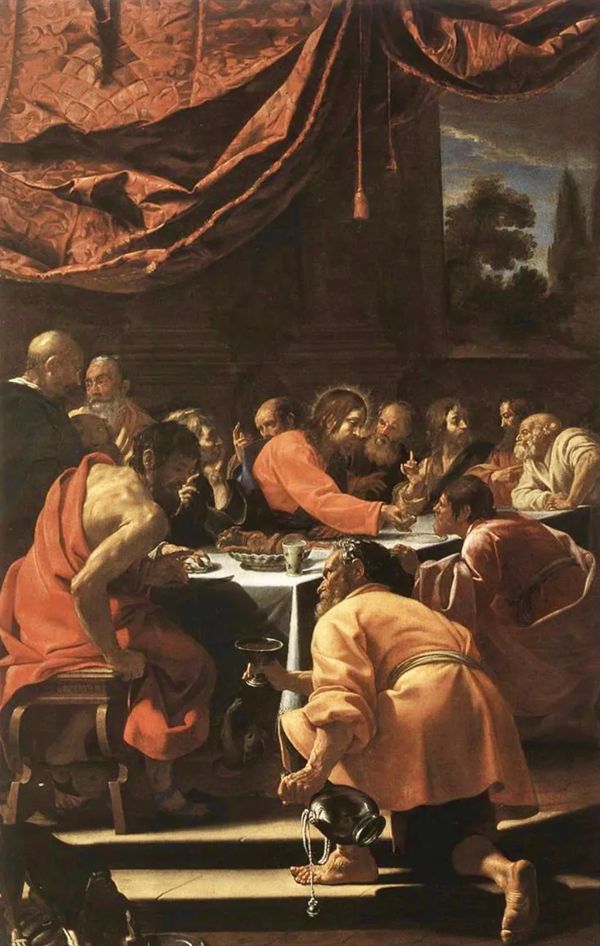(Mk 14:12-16.22-26)
With the persecution of Nero (64) and the bloody civil war in the year of the four Caesars (68-69) defections multiplied in the Roman community of Mk.
One wondered: would it be possible to reconnect with those who had denied or betrayed the faith?
Perhaps even God has cut the bonds of friendship with those who did not make it?
Can one return to fraternising in community once one has rejected it?
The faithful were discovering the answers, precisely by memorialising Christ.
They understood that God's acceptance and heart always overcome our escapes and defeats, as well as cowardly attitudes [cf. vv.17-21 Judas' betrayal; vv.26-50 uncertainty and flight of the disciples, who dreamed of something else].
This is the glad Announcement of Mk to his brethren of faith, on the threshold of the year 70 - still perhaps all to be rediscovered, but embedded in the gesture of 'breaking of the bread' - generator of fraternity and concrete understanding.
The initiative to celebrate Easter does in fact start with the disciples (v.12): the passage is clearly post-Easter.
This is an elaborate catechesis to indicate the most incisive meaning of coming together to break bread.
He who has the task of "accompanying" the disciples to the living and true encounter is a servant who takes on a job at that time reserved only for women (v.13).
This is to say that the community sprung from Christ and the communion of his intimates overturns the old social relations, breaking down the retaliation.
In short, people entering the Eucharistic Banquet see things in a surprising, renewed, exuberant way.
The hall is spacious (v.15): the Church is intended for welcoming and re-welcoming - not proselytising!
The same room is located on the upper floor (v.15) because it is like the Mount on which the Eternal is experienced directly, and from which his Word resounded (Ex 24:3, 7): where the communion of life between God himself and his people was celebrated (Ex 24:1-8).
Again, the room is furnished with triclinia or sofas (v.15): in Christian communities of value, anyone who lives intensely the Lord's Supper becomes free and lordly - despite the uncertain past.
This is also due to the explicit action of the brethren and church leaders.
The short liturgical text of Mark does not allude to the Jewish Passover. In fact, the Eucharistic banquet has no propitiatory connotations.
It derives from the domestic sacrifice [not at the Temple] of «communion» and «thanksgiving» called in Hebrew Zebah Todah (Lev 7:11-13).
«This my body» (v.22) means «This am I».
The Master made his whole story a Gift, a Food; he 'broke' his life for our humanisation.
Victory over death is a Church able to share the same choices, so that he may become One with Him.
In the Communion [conviviality of differences] we are in fact 'One Person' with the Risen One, partakers of his own authentic life current.
Perhaps we have grown accustomed to the Eucharist. But when we approach it wanting to make the Dream and the concrete story of Christ our own, we will not confuse that gesture with any devout, intimate, fervently individual encounter [it is in fact for the «multitudes»: v.24].
For Jesus, that moment was the parting of ways with the First Covenant (v.25) that had not achieved the goal of keeping the life of the people lively and joyful.
Its Community will only make sense as a sign of new humanity, a seed of kinsmen ready to become 'distributed nourishment' that satiates all.
In biblical terms, making a Covenant means precisely becoming 'one body' [so we would say in our language].
Does it look like a contract for two? In the sense of perfect balance, it is only so in legalistic religions that imagine divine predilection towards some men as random, and ours towards him as obligatory.
In the journey in Christ, the faithful and inviolable commitment is only on God's side - not out of benevolent paternalism that here and there masks fortuitous whims, but because the Newness arises precisely from our imbalances and shadow sides.
We are inventors of paths, not creatures destined for one-sidedness.
Our only 'effort' drawn from innate intuition and practical experience is the 'obedient' acceptance of Faith.
God opens up unprecedented perspectives: he reveals himself in the undeserved and superabundant Gift.
In this way, He manifests himself eccentrically and without the pretense of prior conditions of perfection - nor does He fail.
Acceptance of His proposal expands the boundaries of our relationship with Him.
This Communion only grows on the basis of his own initiative - too wise - which infallibly reads the true conditions for growth.
If it were the disciple who set the relationship with the Master, we might fall into veins of opportunism.
We are too used to dwelling in wiles, and only hold fast to opportunistic relationships; of short hope.
The mutual belonging of the sons with the Father is conversely sanctioned in the Eucharistic sign: like an exchange of wedding rings, indissoluble on His part.
[Corpus Christi (year B), 2 June 2024]












